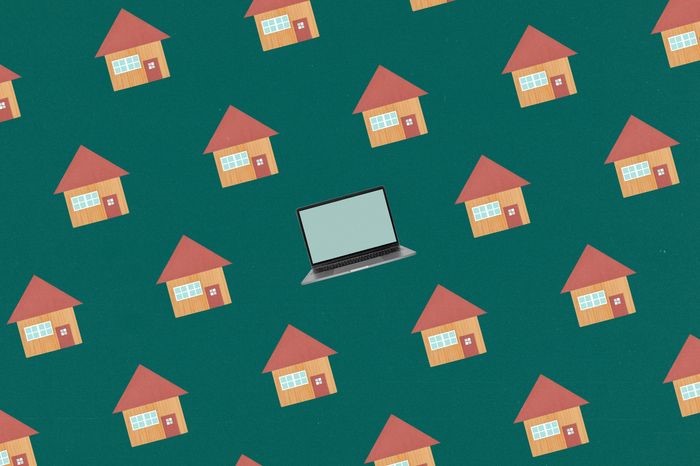How to Work From Home Effectively

In brief
- Identify a space that helps you stay focused and productive.
- Find your routine and stick to it.
- Give yourself a break. Avoid trying to look busy.
Remote work has been on the rise across the U.S. for years, but the coronavirus pandemic significantly accelerated the shift to remote work. This is especially the case for industries and roles that don’t require employees to work in person. “People have learned that this is more possible in roles that they didn’t think it was possible in before,” says Sara Sutton, chief executive and founder of FlexJobs, a career website for telecommuting, flexible, freelance and part-time jobs. She says getting workers set up to be able to work remotely at any time is like an insurance policy for employers in case they find themselves in a similar situation in the future. “I don’t think there’s any organization that is going to realize they should leave this opportunity on the table.”
According to a summer 2020 survey of nearly 800 employers by workplace consulting firm Mercer, 94% of employers said productivity among remote workers either improved or was unchanged.
Despite the rising application and popularity of hybrid work-from-home policies, some employers and employees alike struggle to adjust to certain elements of remote work. There are several key ways in which you can maximize your productivity, lower your stress and make the most of your work-from-home experience.
1. Claim your space.
If you live in a tiny city apartment or a crowded house full of roommates, children or a working spouse, you may feel your options are limited, but it is important to identify a space where you feel you can be focused, productive and comfortable.
There are no catchall rules for certain spaces you absolutely should or should not work in—which is good news for those who can barely cram a bed and a couple of chairs into a studio apartment. Rather than ruling out certain parts of your living area, it is more important to find a space that is tailored to your specific needs, says Ms. Sutton, who has been working from home for 14 years. “Depending on what your personality is, think about what kind of work environment sets you up for success,” Ms. Sutton says.
Which of the following helps you work successfully?
Try ranking these from most to least important:
- A clean workspace.
- A nice view.
- Natural light from a window.
- Being comfortable.
- Having a desk.
- A quiet space.
- A co-working space.
Think about where you do your best work and try to find a space in your home that meets two or three of your top priorities. Also consider whether changing your workspace often helps you work more productively or whether having a single dedicated workspace is better for you.
Ideally, this space will be in some way distinct from the places where you spend your nonwork hours. This will help create a physical separation between your work and personal activities. If you can’t do that, use small objects that will help you create the mental shift from play to work, whether it is an inspiring photo or your favorite coffee mug.
“Even if you’re working at your kitchen table because it’s your only option,” says Ms. Sutton, “I try to put little touchstones of things that help get me in that mind-set.”
2. Find your routine and stick to it.
You may not miss those long, arduous commutes to the office, but they can provide a consistent way to mentally prepare for the workday and decompress when it is over.
If you are used to having a commute, try to recreate the most important features of your morning routine before you start work at home. Do you like reading the news on your train ride? Listening to a podcast in the car? Stretching your legs on a walk to the office? Grabbing a bite at a coffee shop near your workplace? Identify the most important elements of your pre-and postwork routines and stick to them. Avoid the temptation to roll out of bed and start working right away. Set your alarm for 30 minutes earlier than your start time so you don’t miss out on your breakfast, exercise, podcast, or whatever daily activity helps you ease into your day.
Steven Vargas, an artist and journalist based in Los Angeles, says he writes lists every morning to help him set goals for the workday. “When I feel lost or insecure about my career, which happens from time to time, being stuck in my apartment, I look back at my list of accomplishments to remind myself that although things feel difficult, I have the strength and ability to do anything I set my mind to,” says Mr. Vargas.
The same goes for your postwork routine, says Caroline Webb, a behavioral economist and former McKinsey partner, who decompresses by sitting on the couch with her husband at the end of each workday and sharing three good things that happened during the day.
“It marks the transition time from work to personal space,” says Ms Webb, “You are not only giving yourself an immediate boost, but you are also training your mind to be more attentive to other positive things.”
Sticking to a routine will also help prevent you from overworking and help you create a culture of setting healthy boundaries in the workplace, says Ms. Sutton.
3. Give yourself a break.
There is a common stigma around remote work that makes some employees, especially overachievers, feel like they have to overcompensate for not being physically present with their colleagues by working longer hours and always being “on.”
According to data from a Gallup survey conducted during the coronavirus pandemic, those working fully remotely are experiencing more burnout than on-site workers.
Don’t forget to give yourself a break: literally and figuratively.
If you can’t rely on an employee break room or your colleagues to invite you to coffee, push yourself to take breaks throughout the day, whether for lunch, a chat with a co-worker, a meditation session or just a walk. If you are suffering from “Zoom fatigue,” give yourself a break from video calls. It is OK to ask your boss if you can turn your camera off for a while.
Your employer may also offer some activities or ideas to help you take a break and simultaneously bond with your co-workers. These can be a good opportunity to enjoy the social aspects of the workplace you are missing out on.
Claire Kenney, a marketing communications manager at Evention LLC, a software company focused on automation and the reinvention of office processes, says her company has helped employees with work-life balance through virtual happy hours, book clubs and “lunch and learn” events. “This month, we plan to host a virtual ugly-sweater-themed holiday party, during which a local bartender will teach our team how to mix different holiday cocktails,” she said.
Give yourself a break in the emotional sense, too. Be kind to yourself and others. Studies show that when people are kind, they have lower levels of stress hormones, are less depressed, less lonely and happier, in addition to having better cardiovascular health and living longer.
Some technical difficulties with Skype during Ms. Sutton’s interview with this reporter prompted her to talk about the importance of being patient and kind when we run into challenges while working from home.
“We’re all trying to figure it out and sometimes we run into these hiccups,” she said. “Having a little extra grace and kindness these days goes a long way.”
Resources
- Sococo: This software allows you to create a digital version of your physical office with a goal of keeping employees connected. You can virtually “knock” on somebody’s office door and see which teams are meeting around you.
- Noise-canceling headphones: Blocking out screaming kids or roommates on loud conference calls can help you stay focused on your work.
- A mobile hotspot: This can be a helpful backup option if you can’t rely on your home internet connection.
Source: wsj.com
Collect by Minh Tien - Sapuwa
Relative post
- The Virtue of Admitting Fault
- The Power of Admitting A Mistake
- 7 simple tips to tackle working from home
- 5 ways to make working from home better
- Top 10 Reasons to Start Your Own Business
- Success Tip: To Be Different, You Have To Think Different
- How To Stop Thinking And Start Doing
- Connected Employees: 10 ways to connect with your team
- 5 Ways To Help Teams Connect Virtually
- 10 Things Leaders Managing Remote Employees Should Do
- Seven ways to build the solidarity economy
- 4 ways to build culture and unite teams








 0
0


